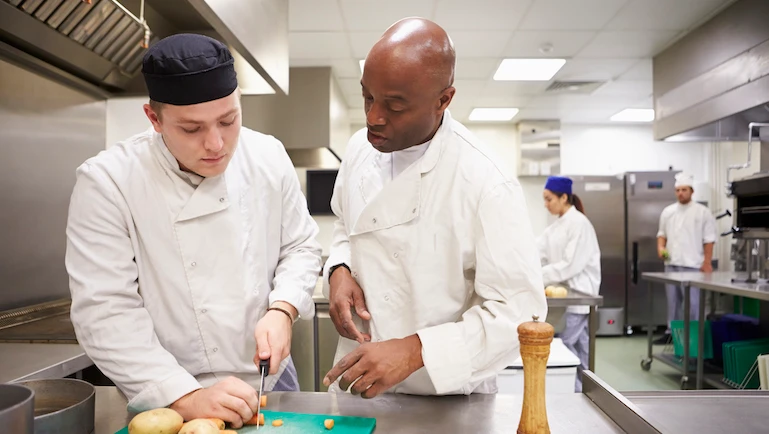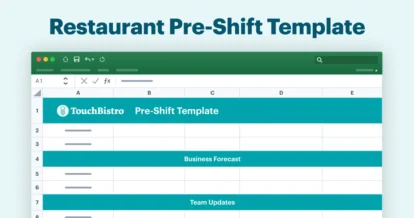Having a restaurant mentor is essential to establishing a long and successful career in the highly competitive restaurant industry. From gaining hands-on experience to learning how to build meaningful work relationships, finding the right mentor can provide the advice and encouragement you need to rise above the competition and run a successful restaurant business.
When looking for a mentor, the best place to start is by listening to the stories of other restaurateurs who have already taken the path to mentorship.
A great example is Chef Peter McQuaid, the Executive Chef of Cala in Scottsdale, Arizona. Named one of Arizona’s “up-and-coming” chefs, Peter’s young age has never stopped him from becoming an established culinary name. So what’s his secret to success? Peter credits his mentors, Chef Beau MacMillan, Chef Silvana Salcido Esparza, and Chef Daniel Boulud, with giving him the courage and experience he needed to climb the kitchen ranks.
On episode 14 of the ResoTalk Podcast, Peter discusses how he started his career under the guidance of these big names in the industry and shares how he went from staging at famous restaurants to becoming the Executive Chef of his very own establishment. Read on to learn:
- What restaurant mentors are
- The benefits of having a mentor
- Tips for how to choose a mentor
- Advice for restaurateurs seeking mentorship
What is a Restaurant Mentor?
As mentioned, Peter started his career under the guidance of experienced culinary professionals, Chef Beau, Chef Silvana, and Chef Daniel. But before getting into the details of how these incredible mentors helped Peter advance his career, it’s first important to understand what a restaurant mentor is.
A restaurant mentor is typically an experienced chef or restaurateur who has opened and run their own restaurant business. Mentors are typically talented in multiple areas of the hospitality industry, allowing them to offer guidance, feedback, and support to less experienced chefs or restaurateurs.
Mentors are essential for building a successful and profit-generating business. This is because they provide support and hands-on training to help you become skilled and competent in your chosen area of expertise much faster than you would on your own.
In addition, restaurant mentors can introduce you to their vast network of restaurant industry professionals, providing you with even more opportunities to learn from your peers.

What Are The Benefits of Having a Restaurant Mentor?
Now that we covered what a restaurant mentor is, it’s time to dive into the benefits of having a mentor of your own. Here are a few key benefits of having a restaurant mentor to guide you through the trials and triumphs of running a restaurant.
Secure Meaningful Career Opportunities
Effective mentors work together with mentees to set job-related goals, track progress, and identify areas of opportunity. This added accountability helps mentees retain their jobs and secure advancement opportunities – something that’s incredibly important in an industry with notoriously high turnover rates. In fact, 94% of workers would stay longer in a job if their employer offered more learning and career development opportunities. Additionally, employees who are involved in a mentoring program have a 50% higher retention rate than those not involved.
Under the guidance of Beau MacMillan, Peter worked at The Sanctuary and rose through the ranks to become a Sous Chef, despite the high-stress environment of the kitchen. Rather than letting the hot and steamy atmosphere deter him, he treated it like a challenge to overcome. As Peter recalls, “I loved the busy night service and how rewarding that felt when you finished strong.”
Thanks to Chef Beau’s constant support, Peter gained the confidence to push through chaotic days in the kitchen. Instead, Peter focused on putting his best foot forward to build a meaningful career.
Develop Essential Management Skills
In addition to helping you succeed in your role, advice from a mentor can also help you learn essential restaurant management skills.
For example, while working with a mentor, you have the perfect opportunity to ask for specific advice on the management side of running a restaurant, including how to train your staff to use kitchen technologies, how to encourage long-term growth, and the best way to motivate a team.
“One of the biggest things I’ve learned from Mac is how to treat your staff and your team with respect,” Peter recalls. “Don’t mess with anyone. Treat everyone fairly. Be respectful of your team and grow an amazing culture.”
It’s this exact guidance on how to treat your team that shaped the way Peter runs his own kitchen today. “I pride myself on the culture in my kitchen. I love taking staff out to celebrate when we’re not working,” Peter says proudly.
Learn How to Overcome Challenges
The guidance that you receive from your restaurant mentor can also help you overcome obstacles – something you’re bound to face a lot of in the restaurant industry. This is because your restaurant mentor’s role is to act as a cheerleader, reminding you to keep going even when things get tough.
For example, when Peter went to culinary school in New York City, he worked under Chef Daniel Boulud at Restaurant DANIEL’s fast-paced and high-heat kitchen environment.
“Working at DANIEL was an amazing experience, but that was a tough kitchen. And there were some days where you just had to mentally push yourself to get through each day. And then in the end, it always paid off and it felt so rewarding,” he says.
Despite all of the challenges Peter faced, working under Chef Daniel motivated Peter to persevere and not give up on his dreams to run his own restaurant. Peter learned that getting through difficult days was essential to build the necessary skills and knowledge needed to run his own restaurant.
“I trained under some of the most intense French chefs in that high-pressure kitchen and learned amazing techniques, speed, kitchen, brigade, and all these old-school traditions that I just love.”

How to Choose a Mentor
If you’re ready to reap the benefits of mentorship, the next step is to learn how to choose a mentor. While there’s no right or wrong way to choose a mentor, there are a couple of easy guidelines you can follow:
Find a Mentor With Skills You Want to Emulate
To start, consider finding a mentor with skills that you want to learn. For example, a line cook who coordinates food preparation in the kitchen might want to learn under an executive chef mentor who can offer guidance on how to manage, train, and oversee the entire kitchen.
In Peter’s case, he’s forever grateful to Chef Beau for taking him under his wing and teaching him cooking skills from such a young age. It’s these skills that Peter thinks really set off his career and prepared him for more than just handling the rigors of the kitchen
“I’ve learned [so many] life skills from cooking,” Peter explains.
Consider a Mentor’s Connections
Mentors typically have more to offer than just teaching you new skills. Many mentors have professional networks that they built up over time as they’ve figured out how to build a successful career in the restaurant industry. These connections are valuable to mentees because they offer more opportunities to learn and grow, both personally and professionally.
For Peter, a milestone moment was when his chef mentor Silvana walked him through how to apply to the Careers Through Culinary Arts Program (C-CAP). Not only did Peter apply, but he also won a scholarship to start culinary school at the International Culinary Center in New York City.
If you’re considering a similar path, there are many benefits of a mentorship program like C-CAP that you should know about, including:
- Learning new approaches to kitchen tools and techniques
- Increasing confidence to reach your goals and aspirations
- Tapping into a network of students, teachers, and industry professionals
- Securing employment via internships or apprenticeships
- Career advising, higher-education scholarships, and more
Simply put, mentors can share their connections to help you expand your professional network. Networking not only increases your visibility in the restaurant industry, but it can also open doors to new job opportunities that accelerate your career growth.

Advice for Restaurateurs Seeking Mentorship
The next step after choosing a mentor is figuring out how to ask someone to be your mentor.
Plus, believing in your own ability to improve your restaurant management skills will help you be more persistent and ready to participate in a mentor-mentee relationship.
How to Ask Someone to be Your Mentor
If you’re an aspiring restaurateur looking for a mentor of your own, you can follow these three easy steps to ask someone to be your mentor:
Step 1: Start a Conversation
First, you’ll need to ask a potential mentor to meet with you. Then you’ll need to explain the kind of knowledge you are seeking to this individual. For example, are you looking to learn kitchen food prep techniques or do you simply want advice on how to move up in your career?
Step 2: Network
If your preferred mentor isn’t willing to be your mentor, that’s okay too. Consider asking this individual if they know other people who could help you achieve your goals. You never know who someone else knows until you ask!
Step 3: Say Thank You
After you’ve reached out, make sure to send a thank you email to a potential mentor to thank them for their time and effort. This is a considerate action to take regardless of whether this individual is willing to be your mentor or not.
Now that you know how to ask someone to be your mentor, it’s time to put these steps into practice. But before you seek a mentor-mentee relationship, it’s important to first develop a growth mindset.
How to Develop A Growth Mindset
A growth mindset simply means viewing your limitations as opportunities to improve instead of roadblocks. After you’ve asked someone to be your mentor and they have accepted their role, it’s essential to develop a growth mindset to be successful.
This is because working in a kitchen is physically demanding and it can be quite stressful at times. With this fast-paced and high-pressure environment, you can even forget why you wanted a mentor in the first place.
“Never give up on cooking and what you’re passionate about. Don’t let the management take away from being in the kitchen and putting your heart into your food,” Peter warns restaurateurs. “Older, younger, no matter where your career takes you, however much stress [there is], you’ve got to put your head down and grind through it,” Peter adds.
Thanks to Peter’s dedication, hard work, and never-give-up attitude, Peter has now found success in opening Cala in Scottsdale, Arizona, with his esteemed chef mentor Beau MacMillan who serves as the restaurant’s Culinary Director.
Peter’s position is Executive Chef where he is building the team and creating new dishes with coastal flavors that transport diners straight to the Mediterranean. Together, Peter and Beau discuss important business topics like food costs, labor costs, and more, to ensure that they are always running a profitable and successful restaurant.
If you’re also looking to grow a successful business in restaurants like Chef Peter, you might consider finding a restaurant mentor of your very own. A mentor can teach you the ropes of how to move up in your career through encouragement, connections to other industry professionals, and expert advice. A successful career working in restaurants is closer than you think!
Sign up for our free weekly TouchBistro Newsletter







